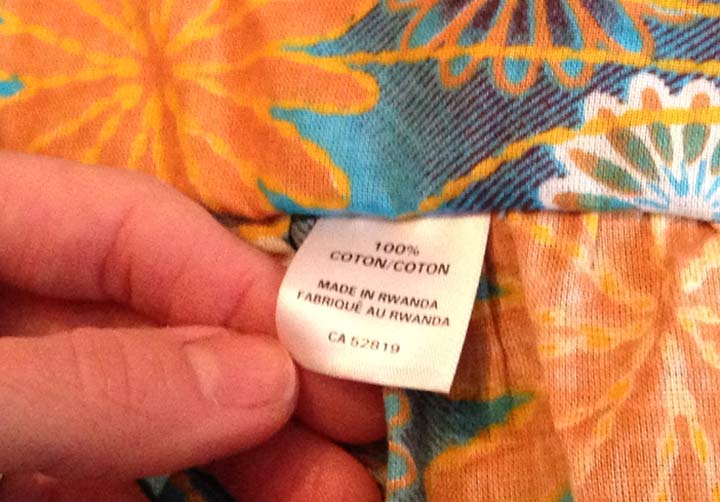Johanne St. Louis knew at age 12 what she wanted to do.

“I told my mom, ‘I want to teach sewing to ladies in Africa.’”
Her childhood ambition brought this native of small town Ontario to a nation that suffered one of the darkest episodes of the late 20th Century, where she met women who had endured unspeakable horror.
The fruits of their work now hang in her quaint clothing store, which occupies the main floor of a century home in the village of Cannington, a 90-minute drive northeast of Toronto.
Mixed among her own clothing designs are bags, aprons and pajamas that bear the vibrant colours of African textiles — and tags that say “Made in Rwanda,” a mundane appellation for most of us, but a profound achievement for the women who made these goods.
“It’s a point of pride for them,” St. Louis told Global News as she showed off aprons made by young women who had come from an orphanage in one of the poorest parts of Kigali, a place hard hit by the genocide.
“They really didn’t have a bright future. I was just back visiting them and I really felt the love.”
Inspired to take her talents to Rwanda
St. Louis was already seeing much success in her own career — sewing clothes for Mirvish theatrical productions and designing the costumes that Olympic gold medal figure skaters Jamie Sale and David Pelletier wore in competition. But her African dream was persistent. She wanted not only to teach sewing, but also to teach it to women who had lived through genocide.
A documentary on Rwanda gave her the inspiration. It mentioned an organization that wanted to teach sewing. She got in touch and in 2008 made her first trip. What she found were widows and orphans of the 1994 genocide, women whose emotional scars ran deep.
“They’ve been through too much. Some of them have a permanent sadness is their eyes.”
They all have similar stories: families ripped apart, husbands, sons, brothers slaughtered — people who had good lives before the mass killings of 1994.
“They were left with nothing. Even less than nothing. A lot of them said they were just in a place where they didn’t know why they had survived and they didn’t want to go on with their lives.”
She was hooked, returning on average twice a year to run workshops to teach them the basics of sewing, help them access proper equipment and organize proper facilities. The women’s skills were at best rudimentary and they lacked a basic understanding of how to deliver finished products on time and according to specifications.
A work in progress
- Train goes up in flames while rolling through London, Ont. Here’s what we know
- Budget 2024 failed to spark ‘political reboot’ for Liberals, polling suggests
- Wrong remains sent to ‘exhausted’ Canadian family after death on Cuba vacation
- Peel police chief met Sri Lankan officer a court says ‘participated’ in torture
It is still a work in progress, but they are improving. And more importantly it is turning around their view of life. In a video St. Louis brought back from her most recent trip in March, we see her with one of her star pupils, Teddy Rwamu, whose husband was killed in the genocide.
“I was struggling,” said Rwamu, who had a basic but inadequate understanding of sewing.
“Then Johanne came and she taught me how to do so many things and so now I’m happy.”
As Rwanda marks the 20th anniversary of the genocide, the nation has been transformed. The economy is coming to life and Kigali is now one of the safer big cities in Africa. There is hope that if these women can elevate their skills and business acumen they might be able to build a nascent clothing industry, perhaps producing linens or school uniforms that could compete with imports from Kenya.
“I just felt that if you could give those people back a little bit of dignity and little bit of hope and maybe make their daily life a little easier,” she said.
The handful of goods that St. Louis sells in her Cannington shop qualify her as a major exporter of Rwandan handicrafts — a measure of how far that nation needs to come.
She has partnered with a Rwandan woman to launch the Doda Fashion House as the first step. (Doda means, “to sew” in Kinyarwanda, the native language.) They are planning to start a proper sewing school to formalize the training.
None of this is a moneymaking operation for St. Louis. She must constantly raise money through the Canadian arm of her organization, Doda International, to pay for her trips to Rwanda and to buy supplies. The women who sew the goods for her shop are paid a fair trade wage.
But the dream of the 12-year-old who wanted to go to Africa is now becoming a reality.
“You can’t take away what happened to them but you can give them something to make life a little bit more bearable.
“I feel I’m needed.”
For more information about Johanne St. Louis’ work in Rwanda and the Doda Fashion House, go to: www.stlouisfashion.ca




Comments